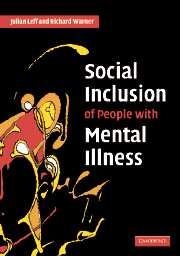Book contents
- Frontmatter
- Contents
- Preface
- 1 Introduction: barriers to social and occupational integration
- Part I The origins of stigma
- 2 The course of psychoses
- 3 The nature of stigma
- 4 Poverty and social disadvantage
- 5 Ameliorating users' symptoms
- 6 Dismantling psychiatric institutions
- 7 Reducing fear and discrimination among the public
- 8 Tackling self-stigmatisation
- Part II Overcoming obstacles to employment
- References
- Index
3 - The nature of stigma
from Part I - The origins of stigma
Published online by Cambridge University Press: 24 October 2009
- Frontmatter
- Contents
- Preface
- 1 Introduction: barriers to social and occupational integration
- Part I The origins of stigma
- 2 The course of psychoses
- 3 The nature of stigma
- 4 Poverty and social disadvantage
- 5 Ameliorating users' symptoms
- 6 Dismantling psychiatric institutions
- 7 Reducing fear and discrimination among the public
- 8 Tackling self-stigmatisation
- Part II Overcoming obstacles to employment
- References
- Index
Summary
What constitutes stigma?
Most writers on stigma begin by pointing out its linguistic origin in ancient Greece, when the term referred to a brand or scar burned or cut into the body to signify that the bearer was a slave, criminal or otherwise set apart (Clausen, 1981). There is an interesting parallel with the biblical Cain, who, having killed his brother Abel, is marked by God. However, this sign, visible to all who meet Cain, conveys a double message: on the one hand it pronounces him the first murderer, but on the other it declares that Cain, doomed to be a wanderer on the face of the earth, is under God's protection and cannot be harmed by any person. There is a link to the supernatural origin of stigmata and their positive connotation in the use of the term during earlier times to refer to marks resembling the wounds on the crucified body of Christ, which were reported to have appeared on the living bodies of saints and other holy people.
The contemporary usage of the term is entirely negative, as indicated by the subtitle of Goffman's (1963) groundbreaking work on stigma, Notes on the Management of Spoiled Identity. Goffman's main argument is that stigmatising attitudes and behaviours by others constitute a threat to the targeted individual's identity. He analyses the different aspects of identity that come under attack, and describes the common responses mobilised to defend one's identity in this situation.
- Type
- Chapter
- Information
- Social Inclusion of People with Mental Illness , pp. 19 - 40Publisher: Cambridge University PressPrint publication year: 2006

